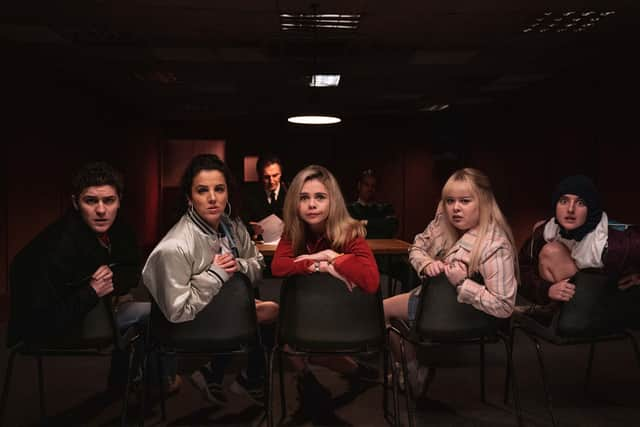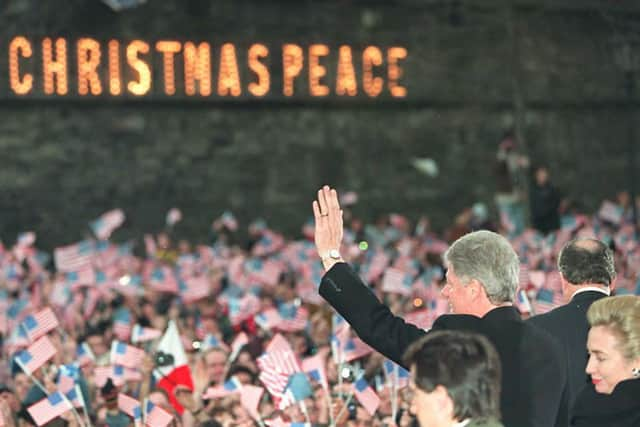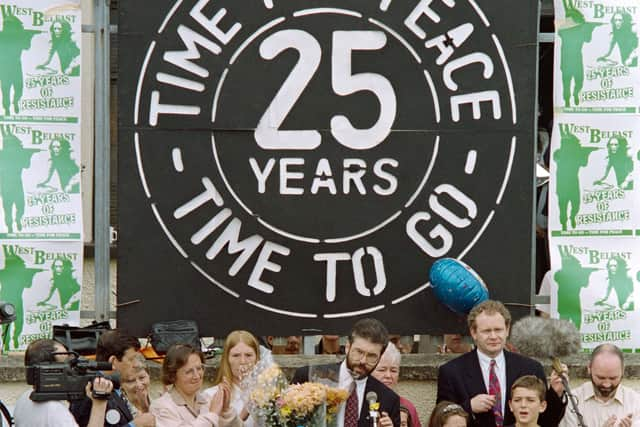When is Derry Girls set? Show’s era and significant Northern Ireland events, including Good Friday Agreement
and live on Freeview channel 276
Set in Derry, Northern Ireland, Derry Girls follows the story of five friends as they navigate life in the 1990s.
The show takes place at the end of a period of unrest known as the Troubles and follows the subsequent road to peace, covering the 1994 IRA Ceasefire, President Bill Clinton’s visit and the Good Friday Agreement.
Advertisement
Hide AdAdvertisement
Hide AdBut are the events in Derry Girls based on real life? Here’s everything you need to know.
When is Derry Girls set?
Derry Girls takes place in the city of Derry in Northern Ireland during the 1990s.
Set against the backdrop of the Troubles, it is a coming-of-age story, following five teens as they navigate life through the final years of Northern Ireland’s conflict.
Season one is set in 1994, which is the year of the first IRA ceasefire.
Advertisement
Hide AdAdvertisement
Hide AdSeason two is set in 1995 and season three takes place across two years: 1996 and 1997.
There will also be a special bonus episode called Agreement, that is set in 1998 and will cover the signing of the Good Friday Agreement, which solidified peace in Northern Ireland.
What historical events does Derry Girls cover?


Derry Girls is set in Northern Ireland in the 1990s.
This was a time of both political unrest and the road towards peace, and the comedy series covers both equally: from the Omagh bomb, to the 1994 IRA ceasfire.
Here are some historical events in Derry Girls:
President Bill Clinton’s visit to Derry


President Bill Clinton and his wife Hillary visited Northern Ireland in 1995.
Advertisement
Hide AdAdvertisement
Hide AdOn 30 November 1995, he delivered a message of hope to Derry residents at the city’s Guildhall Square.
The event, which features in the season two finale, shows Grandpa Joe (Ian McElhinney) eagerly wanting to catch a glimpse of him and Sister Michael (Siobhan McSweeney) enraging her students by refusing to give them the day off.
As depicted in the season two finale, crowds in Derry chanted, “We want Bill.”
President Clinton addressed the crowd saying: “Daily life has become more ordinary but this will never be an ordinary city!”
Chernobyl disaster
Season one touches on the Chernobyl disaster.
Advertisement
Hide AdAdvertisement
Hide AdThe nuclear accident which happened in Ukraine, then part of the Soviet Union, in 1986 claimed 31 lives and left 1,000 square miles of uninhabitable land surrounding the power plant due to radiation.
The episode shows a student exchange programme, where students impacted by Chernobyl could visit Derry and stay with students.
1994 Ceasefire


The IRA Ceasefire of 1994 is covered in season two.
The IRA marked the first of its two ceasefires on 31 August 1994 as a commitment towards restoring peace.
It was the first time there had been a ceasefire in nearly three decades of unrest.
Advertisement
Hide AdAdvertisement
Hide AdThe episode recounts the joy of Derry residents as Erin’s family watches the report on TV, only to go outside and see everyone is celebrating.
Good Friday Agreement
Derry Girls will cover the Good Friday Agreement in their bonus episode, which is set to air after the season three finale.
The Good Friday Agreement marked the beginning of the peace process in Northern Ireland.
It was signed by the British and Irish governments and political parties in Northern Ireland, and outlined how Northern Ireland should be governed.
Advertisement
Hide AdAdvertisement
Hide AdThe goal of the agreement was to create a power sharing executive, so that both Unionist and Nationalist communities had equal representation.
1998 Omagh bomb
Although not directly referenced as the Omagh Bomb, which happened in 1998, the season one finale ended on a serious note, covering a car bomb.
The Omagh bomb was carried out in 1998 by the Real IRA in response to the signing of the Good Friday Agreement.
A total of 29 people lost their lives, on what was a busy shopping day in the County Tyrone town.
Advertisement
Hide AdAdvertisement
Hide AdReflecting on the bombing, Derry Girls writer Lisa McGee said to the Radio Times: “There were lots of day-to-day things that were funny but occasionally there was something big like Omagh, that the whole nation went ‘this just has to change’.
“I’ve not based anything on any particular incident, but it was just something at that scale."
Comment Guidelines
National World encourages reader discussion on our stories. User feedback, insights and back-and-forth exchanges add a rich layer of context to reporting. Please review our Community Guidelines before commenting.
